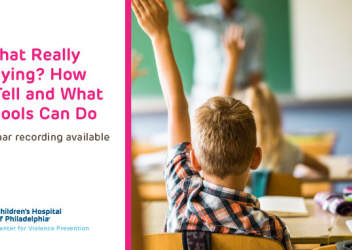Research In Action
Research In Action
Breadcrumb

Children in schools often use a more ‘hidden’ form of aggression, called relational aggression, which is behavior such as exclusion or spreading rumors that aims to damage someone’s relationships or social status. Relationally aggressive youth often negatively influence the social and academic environment at school, resulting in an increased risk for depression, anxiety, physical complaints, and conduct problems among those who experience relational aggression. However, these aggressive behaviors are more difficult to detect, and children and teachers often perceive them differently.
To target school-based prevention and intervention programs to those most in need, my Center for Violence Prevention (CVP) colleague Stephen Leff, PhD and I joined researchers from Drexel University to publish a recent study that helps improve the identification of relationally aggressive students. Rating tools were administered in 11 third through fifth-grade classrooms to identify relationally aggressive students. These data were then analyzed to determine the likelihood of a student being identified as relationally aggressive by their teacher and/or peers or not identified as relationally aggressive by either group. We explored numerous factors that may contribute to the identification of relationally aggressive students, including their academic competence, social skills, popularity, and gender.
Teachers May Not Notice Harmful Aggressive Behaviors
We found that:
- 10% of students were identified as relationally aggressive by their peers but not their teacher.
- Female students were more likely to be identified as relationally aggressive by both their teacher and peers.
- Students with higher levels of academic competence were more likely to be identified by their peers, but not their teacher.
- These students’ academic characteristics of participation and motivation potentially blinded teachers from seeing these harmful aggressive behaviors.
This study highlights the importance of getting information about more subtle relationally aggressive behaviors from not just teachers, but also from other peers at school. It also suggests that additional teacher training may be needed since a certain percentage of children who use relational aggression are not being noticed by teachers. An example of teacher training is the Bullying Classroom Check-Up (BCCU) program, developed as a collaboration between CVP and colleagues at Johns Hopkins School of Public Health, which helps teachers through coaching and guided practice to identify and respond to all types of aggressive behaviors, with a strong focus on the more subtle and often overlooked relationally aggressive behaviors.
The Mentorship Experience
The first author of the paper, Chandler Puhy, was a master’s student, and as her mentor for her thesis, we discussed how relationally aggressive kids are often socially strong, popular (not necessarily well-liked), and may not be disruptive in an overt way. She felt this would likely impact how teachers and peers could see these children differently. Peer reports in elementary school, where one child reports on all kids in a classroom and then an average per kid is created using all kids in that classroom, are costly and time-consuming to gather.
Together we also wondered if teacher report was used, how many children would not be identified as compared to peer reports. We also discussed if there was a mismatch between informants--was it due to more positive skills like academic engagement that masked the socially manipulative behaviors? The result was this paper, and it really helps us to understand the importance of multiple informants; if there are instances where peer report is cost or time prohibitive, we also know how many children might not be identified and would still need intervention services. This also highlights an area for future research to uncover ways to help teachers, who are often on the “front lines,” in identifying all forms of aggression.




